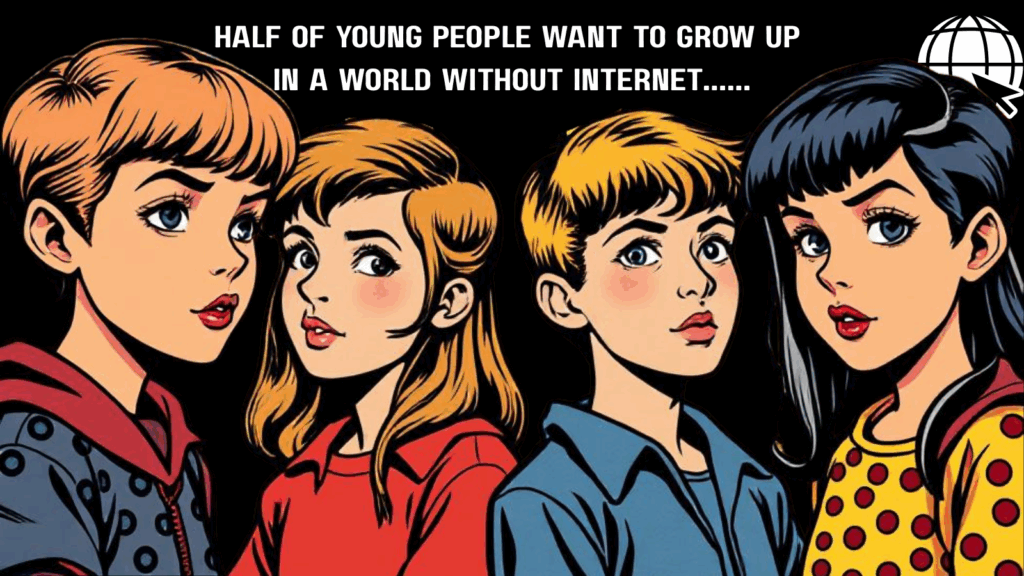A recent UK study has revealed a striking sentiment among young people: nearly half of 16- to 21-year-olds would prefer a world without the internet, a reality they have never known. This finding, drawn from a survey conducted by the British Standards Institution (BSI) and reported by multiple outlets, underscores growing concerns about the impact of digital technology on mental health, social connection, and personal well-being. At the same time, it highlights a desire for solutions that balance the benefits of connectivity with protections against its harms. This article explores the issues raised by the study, potential solutions, and the broader implications for society.

The Issues: Why Young People Are Rejecting the Internet
Negative Impact on Mental Health
The BSI survey found that nearly 70% of young people aged 16 to 21 feel worse about themselves after using social media. This statistic points to a significant mental health toll, with platforms like TikTok and Instagram often exacerbating feelings of inadequacy, anxiety, and social comparison. The constant pressure to curate a perfect online persona, coupled with exposure to idealised images and lifestyles, is taking a toll on young people’s self-esteem. In the same survey, three-quarters said they had spent more time online as a result of the pandemic, while 68% said they felt the time they spent online was detrimental to their mental health. Andy Burrows, the chief executive of the suicide prevention charity the Molly Rose Foundation, said it was “clear that young people are aware of the risks online and, what’s more, they want action from tech companies to protect them”.
He added that algorithms can provide content that “can quickly spiral and take young people down rabbit holes of harmful and distressing material through no fault of their own”. New laws were “urgently required to finally embed a safe by design approach to regulation that puts the needs of children and society ahead of those of big tech”, he said.
Excessive Screen Time and Addiction
The study revealed that a quarter of respondents spend four or more hours daily on social media, indicating a potential dependency on digital platforms. This excessive screen time is linked to disrupted sleep patterns, reduced productivity, and a diminished sense of real-world connection. The addictive nature of social media, driven by algorithms designed to maximise engagement, keeps young people tethered to their devices, often at the expense of their mental and physical health.
Exposure to Online Risks
Young people face a range of online risks, from cyberbullying and misinformation to exposure to harmful content. The survey noted that 42% of respondents admitted to lying to their parents or guardians about their online activities, suggesting a lack of oversight and accountability. The study, conducted by the British Standards Institution, surveyed 1,293 young people and found that 27% of respondents have shared their location online with strangers. Rani Govender, a policy manager at the NSPCC, emphasised that young people are vulnerable to these risks at all hours, not just during late-night scrolling. This highlights the need for systemic changes to protect users from the darker corners of the internet.
Desire for a Simpler, Offline World
Perhaps the most striking finding is that 46% of young people would prefer to grow up in a world without the internet entirely. This sentiment reflects a longing for a simpler, less connected era where face-to-face interactions and real-world experiences take precedence. For a generation that has grown up with smartphones and social media, this rejection of digital culture signals deep dissatisfaction with its impact on their lives.
Proposed Solutions: Balancing Connectivity and Well-Being
Implementing a Digital Curfew
Half of the survey’s respondents supported the idea of a “digital curfew,” which would restrict access to certain apps and websites after 10 p.m. This measure, backed by UK Technology Secretary Peter Kyle, aims to reduce late-night screen time and promote healthier sleep habits. However, experts like Govender caution that a curfew alone is insufficient, as online risks persist around the clock. A curfew could be a starting point, but it must be paired with broader strategies to be effective.
Designing Safer, Less Addictive Platforms
The study calls for social media companies to prioritize user safety by creating platforms that are less addictive and more transparent. Govender advocates for “much safer and less addictive sites” that minimise exposure to harmful content and reduce the algorithmic pull that keeps users scrolling. This could involve redesigning algorithms to prioritize meaningful content over sensationalism and implementing stricter content moderation to filter out harmful material. While only 27% want phones banned in schools, a whopping 79% say technology companies should be required by law to build robust privacy safeguards into technology and platforms used by children and teenagers, such as age verification or identity checks.
Enhancing Digital Literacy and Parental Oversight
Educating young people and their families about safe internet use is critical. The survey’s finding that 42% of young people lie about their online activities suggests a gap in communication and trust. Schools and community programs could offer digital literacy courses to teach young people how to navigate online spaces responsibly, recognise misinformation, by teaching critical thinking skills and how to triangulate resources to discern the truth of the matter or form opinions based on facts over emotion or rhetoric. It could also review ways to manage screen time. Parents, meanwhile, could be equipped with tools to monitor and guide their children’s online behaviour without resorting to invasive surveillance.
Sex Differences (Boys V Girls) in the Digital World
The data also highlights distinct online experiences based on sex. Young women report higher exposure to harassment (37% vs 28% of young men) and are more likely to compare their appearance or lifestyle to others, with 85% doing this at least sometimes and nearly half (49%) doing so often or very often. Young women are also more likely to set up fake or decoy accounts (43% vs 36%), and 79% have been influenced to purchase something because of social media (e.g. TikTok), compared to 59% of males.
Encouraging Offline Connections
To address the desire for a world without the internet, policymakers and communities could invest in creating more opportunities for in-person interaction. The BSI’s 2025 Global Workforce Entrants Study found that 74% of young workers made friends at work and 52% preferred in-person meetings, highlighting the value of face-to-face connections. Initiatives like community centres, extracurricular activities, and tech-free events could help young people build meaningful relationships offline, reducing their reliance on digital platforms for social validation.
Broader Implications: A Call for Systemic Change
The survey’s findings signal a generational shift in attitudes toward technology. While the internet has brought unprecedented access to information and connectivity, its downsides—mental health challenges, addiction, and exposure to risks—are prompting young people to question its value. This sentiment aligns with broader societal concerns about the unchecked power of tech companies and the need for regulation. The UK government’s consideration of measures like mandatory app cut-off times reflects a growing recognition that self-regulation by tech giants is insufficient. However this, for me is not an issue that the Tech giants or Governments should be the key players in. We need to take back autonomy and responsibility for our own actions and cut down time and reliance on technology.
Moreover, the study underscores the importance of involving young people in shaping solutions. Their first-hand experiences with social media’s impact make them critical stakeholders in designing a safer, more balanced digital future. Policymakers, tech companies, and educators must collaborate to create an internet that serves as a tool for empowerment rather than a source of harm, alongside individual accountability for all of us – in relation to how we use and introduce technology with our children and then as adults.
Conclusion
The BSI survey reveals a generation grappling with the internet’s dual nature: a powerful tool for connection and creativity, but also a source of stress, isolation, and risk. Nearly half of young people yearning for a world without the internet is a wake-up call for society to address the negative impacts of digital culture. By implementing measures like digital curfews, designing safer platforms, enhancing digital literacy, and fostering offline connections, we can create a digital and non-digital ecosystem that prioritises well-being over engagement. The challenge now is to act on these findings, ensuring that technology serves young people rather than controls them, and opportunities for social enrichment without technology are invested in.
References
- The Guardian Almost half of young people would prefer a world without internet, UK study finds https://www.theguardian.com/technology/2025/may/20/almost-half-of-young-people-would-prefer-a-world-without-internet-uk-study-finds
- BSI Half of young people want to grow up in a world without internet https://www.bsigroup.com/en-GB/insights-and-media/media-centre/press-releases/2025/may/half-of-young-people-want-to-grow-up-in-a-world-without-internet/
- Almost Half Of Young People Want A World Without The Internet – The kids aren’t alright. https://secretldn.com/young-people-without-internet/
- BSI Pandemic’s Impact: Young Workers Value In-Person Connections, BSI Finds https://www.bsigroup.com/en-US/insights-and-media/media-center/press-releases/2025/april/pandemics-impact-young-workers-value-in-person-connections-bsi-finds/
- TECH DIGEST www.techdigest.tv -Nearly half of young people would prefer world without internet, study shows – Tech Digest – https://www.techdigest.tv/2025/05/nearly-half-of-young-people-would-prefer-world-without-internet-study-shows.html
- TECH DIGEST M&S boss faces £1m pay cut following cyber attack, Spain hit by phone and internet blackouts – Tech Digest – www.techdigest.tv https://www.techdigest.tv/2025/05/supermarket-supplier-hit-by-cyber-attack-spain-hit-by-phone-and-internet-blackouts.html
